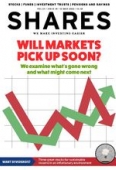Archived article
Please note that tax, investment, pension and ISA rules can change and the information and any views contained in this article may now be inaccurate.
Not everything is having a bad time. One fund is up nearly 18% this year

Barry Norris, founder of Argonaut Capital and manager of the long-short VT Argonaut Absolute Return Fund (B7FT1K7), takes no prisoners with his investment style, an approach which reflects his interest in military history and strategy.
Describing the fund’s first quarter performance, Norris quotes Prussian Field Marshall Helmuth von Moltke who observed that ‘no plan survives first contact’.
In other words, the invasion of Ukraine saw the fund’s over-exposure to commodities give it a much higher negative correlation with the broader market than Norris anticipated.
As result, the manager reduced the amount of money where the fund would profit if certain share prices fell (known as ‘short’ selling) and sharpened his focus on stocks which he hoped would rise in value (his ‘long’ book).
That decision led to the fund returning 1.4% during March, compared with a 0.6% return for the Investment Association’s absolute return sector.
Together with April’s gain of 6.2%, Norris’s contrarian approach has generated a return for his investors of 17.8% so far this year against a loss of 1.4% for the IA’s absolute return sector.
The rationale for his over-exposure to energy and materials stocks is simple: there is too little commodities supply to meet demand.
‘Since the financial crisis of 2008 we have had a bear market in fossil fuels and a bull market in almost everything else, based on cheap money, inexpensive energy, and free trade, all of which are now in the rear-view mirror,’ writes Norris in his Argonautica Blog.
‘Investors lost interest in energy: cast out by the high priests of ESG (environmental, social and governance) into the financial wilderness, to live out the remainder of its days in penitence for its sins.
‘Like the Israelites emerging from Sinai, with oil now back over $100 per barrel, fossil fuels are now being welcomed back from exile and look set to be the best performing asset class of the next decade.’
Even the great electric vehicle evangelist Elon Musk, chief executive of Tesla (TSLA:NYSE), has joined the chorus: ‘Hate to say it, but we need to increase oil and gas output immediately.’
Asked if he can foresee anything to make him change his view, Norris says there is already plenty of pushback.
‘China locking down again will probably affect spot prices, but not futures prices because at some point it will remove restrictions, and unless the Fed is trying to kill inflation to the extent it kills the cycle then no,’ he comments.
The Federal Reserve can’t do anything to stimulate energy supply, says Norris, and rate hikes will have to do a lot more damage to financial assets before they start to hurt the economy.
As well as energy and materials, which made up nearly 60% of the fund’s net exposure at the end of the first quarter, Norris likes industrials, although he also has several bets in the sector where he would profit from a falling share price.
‘Pricing power has now swung from innovators to commodity producers. Electric vehicle manufacturers still have easy access to capital and high valuations, but the bottleneck is the raw commodities, which will remain supply constrained for many years to come,’ he argues.
‘Every electric vehicle manufacturer will now warn on volumes and gross margins. The choice for the investor is simple: would you rather pay 50 times profitless sales to buy an EV manufacturer or three times earnings to buy a nickel miner with no debt? We want to be short the former and long the latter.’
ANTI-ESG VIEWS
Norris reserves his greatest scorn, however, for the ‘mountains of dumb money’ as he calls it pouring into ESG funds, in particular investments in wind power.
As he sees it, politicians in the UK in particular ‘have fallen into the trap of focusing solely on the low cash cost of intermittent renewable production, without realising the value of this energy to the grid will always be low and as the market share of wind increases it will be negative’.
Wind energy is protected against its own low value to the grid by a subsidy, without which, even at high energy prices, wind projects will not be financially sustainable, he argues.
‘A renewable grid will produce abundant electricity for a few days annually and prohibitively expensive and unreliable power the rest of the time, resulting in demand destruction and supply rationing. This is a monumental misallocation of capital and a generational policy folly.’
His ardent opposition to renewables is unlikely to win him many friends or investors among the ESG fraternity, but Norris is a manager who thrives on taking a contrarian view.
He was one of the few fund managers brave enough to short German payments company Wirecard before it collapsed in 2020 due to a €1.9 billion accounting fraud.
Having met the firm several times, Norris described it as having had ‘more red flags than a communist rally’.
Without short sellers, he argues, ‘we would inevitably have a more dishonest stock market and that would lead to a higher cost of capital and lower long-term economic growth.’
Important information:
These articles are provided by Shares magazine which is published by AJ Bell Media, a part of AJ Bell. Shares is not written by AJ Bell.
Shares is provided for your general information and use and is not a personal recommendation to invest. It is not intended to be relied upon by you in making or not making any investment decisions. The investments referred to in these articles will not be suitable for all investors. If in doubt please seek appropriate independent financial advice.
Investors acting on the information in these articles do so at their own risk and AJ Bell Media and its staff do not accept liability for losses suffered by investors as a result of their investment decisions.
Issue contents
Feature
Great Ideas
- Buy dominant Adobe now before rest of the market wakes up to its appeal
- Impressive SDI flags record year with another to follow
- Take advantage of a rare opportunity to buy Smithson at a discount
- How Latitude Horizon protects against capital losses and inflation now
- Why every ESG investor should buy this property stock now
- Take advantage of share price weakness to buy K3 Capital at a knockdown price

 magazine
magazine








